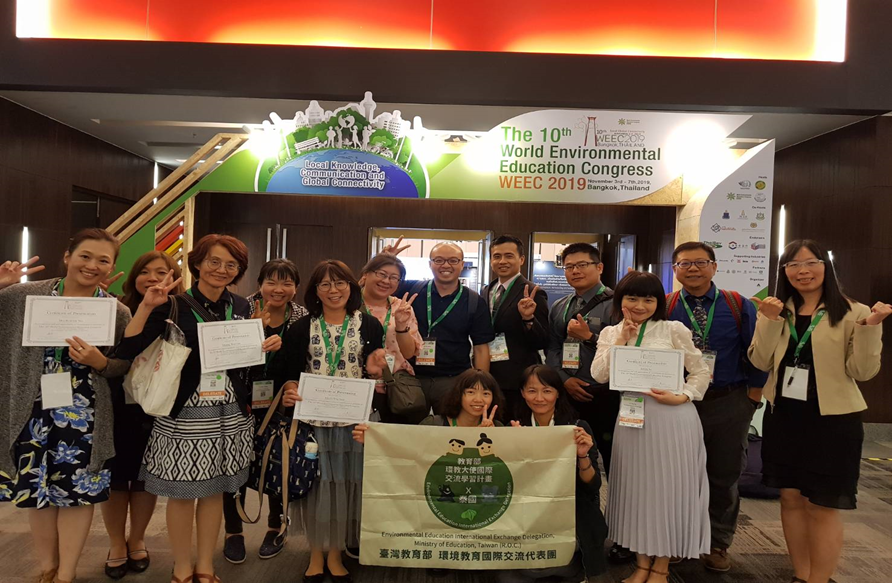School Environmental Education in a Link with the South-bound Countries to Establish a New Partnership

From 2019, to promote school environmental education (EE), international collaboration, and innovative strategies for EE development, the Ministry of Education of the Republic of China (the MOE of the R.O.C.) initiated the international exchange program of EE delegation, and this year the program included the officials and members of the counselling groups from county and city governments, and the first-line school teachers, to participate in the 10th World Environmental Education Congress (WEEC 2019) held in Bangkok, Thailand. In addition, the delegation also visited Eco-School Green Flag Schools and Chulaongkorn University to learn about their implementation experience of EE and Education for Sustainable Development (ESD).
The WEEC was in the 10th session, and it was the first time held in Thailand, Asia, with more than 60 countries participating this year. Through the forum, oral & poster presentations, roundtables, and other significant measures, the delegation from the MOE of the R.O.C. actively promoted the EE achievements of schools in Taiwan and bring worldwide attention to efforts of the R.O.C. in EE good practice. The congress took "Local Knowledge, Communication and Global Connectivity" as the main theme, and the delegation of the MOE of the R.O.C. echoed the theme, and combined the Curriculum Guidelines of 12-year Basic Education of the R.O.C. “Environmental Education Significant Issues”, to illustrate regular EE implementation and teaching inquiry in schools, including the following measures of environmental education in eight schools: “Garden City of Taipei” - small farm project, air quality education in Kaohsiung City, Blue Ocean Education in New Taipei City, constructing eco-habitats in the school campuses of Keelung City, Environmental Education Digital Learning in Hsinchu City, the eco-campus in Changhua County, EE Action Learning in Hsinchu County, and a teaching approach for an ecological cycle system in Pingtung County. With such diverse EE practices, schools of the R.O.C. grasped this opportunity to show the world their highlights and characteristics in a multi-faceted manner.
At present, the environmental protection policy of Thailand focuses on Zero Waste. The schools in Thailand which the delegation visited have incorporated this concept into their school development policy. The Eco-School Green Flag School, Klongratumratutit School, introduced the school's history of being a green flag school, and explained how the school guides students to implement Zero Waste in their lives with the concept of the 7Rs (Rethink, Reduce, Reuse, Recycle, Repair, Reject, Return). Another Eco-School Green Flag School, Bangkok International Preparatory and Secondary School, is a leader of the Eco-Team. Through routine discussions and activities, and students’ promotion of their plans to their class, this school expects to carry out an impact on the school students. Chulalongkorn University Demonstration Elementary School (Satit Chula) holds a regular event of collecting “environment-friendly” good points, integrating the Zero Waste concept into the courses for all grades, and also requires the school's shop to cooperate with all school management provisions.
According to the Curriculum Guidelines of 12-year Basic Education of the R.O.C., "Environmental Education" is one of the significant learning themes, covering topics such as environmental ethics, sustainable development, climate change, disaster prevention, and sustainable use of energy resources. Via policy guidance, the MOE of the R.O.C. promotes a systematic and consistent operation of environmental education counseling groups in 22 counties and cities, for developing local learning themes with their own specific environmental features. In addition, the MOE of the R.O.C. established a website of “Ministry of Education Green School” to provide teachers, students and the general public with environmental learning information. Other measures such as environmental education competitions and the selection of outstanding personnel are actively cultivating school environmental education talent. The MOE of the R.O.C. will continue to promote the strategy of diversified EE practices, expand the international perspectives of teachers and students, and foster the EE engaging energies “taking the initiative, engaging the public, and seeking the common good”, in order to achieve the objectives of environmental education towards sustainable development goals(SDGs).